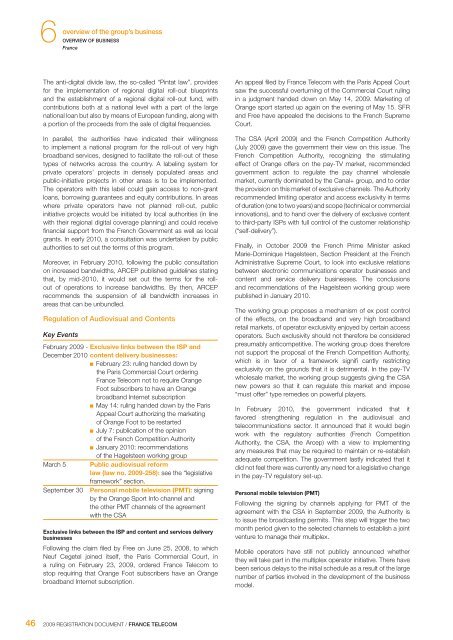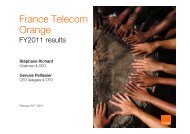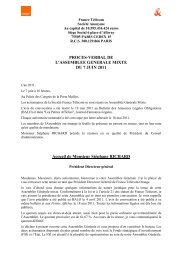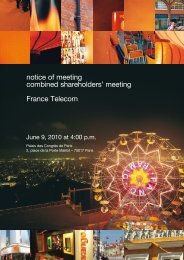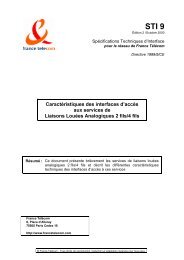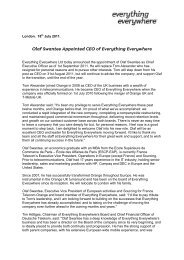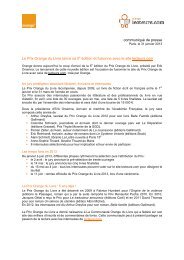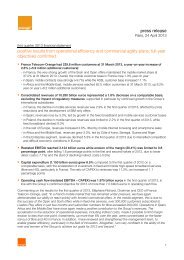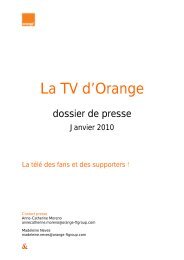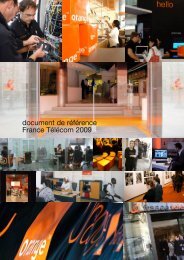registration document France Telecom 2009 - Orange.com
registration document France Telecom 2009 - Orange.com
registration document France Telecom 2009 - Orange.com
You also want an ePaper? Increase the reach of your titles
YUMPU automatically turns print PDFs into web optimized ePapers that Google loves.
6 OVERVIEW<br />
overview of the group’s business<br />
OF BUSINESS<br />
<strong>France</strong><br />
The anti-digital divide law, the so-called “Pintat law”, provides<br />
for the implementation of regional digital roll-out blueprints<br />
and the establishment of a regional digital roll-out fund, with<br />
contributions both at a national level with a part of the large<br />
national loan but also by means of European funding, along with<br />
a portion of the proceeds from the sale of digital frequencies.<br />
In parallel, the authorities have indicated their willingness<br />
to implement a national program for the roll-out of very high<br />
broadband services, designed to facilitate the roll-out of these<br />
types of networks across the country. A labeling system for<br />
private operators’ projects in densely populated areas and<br />
public-initiative projects in other areas is to be implemented.<br />
The operators with this label could gain access to non-grant<br />
loans, borrowing guarantees and equity contributions. In areas<br />
where private operators have not planned roll-out, public<br />
initiative projects would be initiated by local authorities (in line<br />
with their regional digital coverage planning) and could receive<br />
fi nancial support from the French Government as well as local<br />
grants. In early 2010, a consultation was undertaken by public<br />
authorities to set out the terms of this program.<br />
Moreover, in February 2010, following the public consultation<br />
on increased bandwidths, ARCEP published guidelines stating<br />
that, by mid-2010, it would set out the terms for the rollout<br />
of operations to increase bandwidths. By then, ARCEP<br />
re<strong>com</strong>mends the suspension of all bandwidth increases in<br />
areas that can be unbundled.<br />
Regulation of Audiovisual and Contents<br />
Key Events<br />
February <strong>2009</strong> - Exclusive links between the ISP and<br />
December 2010 content delivery businesses:<br />
■ February 23: ruling handed down by<br />
the Paris Commercial Court ordering<br />
<strong>France</strong> <strong>Tele<strong>com</strong></strong> not to require <strong>Orange</strong><br />
Foot subscribers to have an <strong>Orange</strong><br />
broadband Internet subscription<br />
■ May 14: ruling handed down by the Paris<br />
Appeal Court authorizing the marketing<br />
of <strong>Orange</strong> Foot to be restarted<br />
■ July 7: publication of the opinion<br />
of the French Competition Authority<br />
■ January 2010: re<strong>com</strong>mendations<br />
of the Hagelsteen working group<br />
March 5 Public audiovisual reform<br />
law (law no. <strong>2009</strong>-258): see the “ legislative<br />
framework” section.<br />
September 30 Personal mobile television (PMT): signing<br />
by the <strong>Orange</strong> Sport Info channel and<br />
the other PMT channels of the agreement<br />
with the CSA<br />
Exclusive links between the ISP and content and services delivery<br />
businesses<br />
Following the claim fi led by Free on June 25, 2008, to which<br />
Neuf Cegetel joined itself, the Paris Commercial Court, in<br />
a ruling on February 23, <strong>2009</strong>, ordered <strong>France</strong> <strong>Tele<strong>com</strong></strong> to<br />
stop requiring that <strong>Orange</strong> Foot subscribers have an <strong>Orange</strong><br />
broadband Internet subscription.<br />
An appeal fi led by <strong>France</strong> <strong>Tele<strong>com</strong></strong> with the Paris Appeal Court<br />
saw the successful overturning of the Commercial Court ruling<br />
in a judgment handed down on May 14, <strong>2009</strong>. Marketing of<br />
<strong>Orange</strong> sport started up again on the evening of May 15. SFR<br />
and Free have appealed the decisions to the French Supreme<br />
Court.<br />
The CSA (April <strong>2009</strong>) and the French Competition Authority<br />
(July <strong>2009</strong>) gave the government their view on this issue. The<br />
French Competition Authority, recognizing the stimulating<br />
effect of <strong>Orange</strong> offers on the pay-TV market, re<strong>com</strong>mended<br />
government action to regulate the pay channel wholesale<br />
market, currently dominated by the Canal+ group, and to order<br />
the provision on this market of exclusive channels. The Authority<br />
re<strong>com</strong>mended limiting operator and access exclusivity in terms<br />
of duration (one to two years) and scope (technical or <strong>com</strong>mercial<br />
innovations), and to hand over the delivery of exclusive content<br />
to third-party ISPs with full control of the customer relationship<br />
(“self-delivery”).<br />
Finally, in October <strong>2009</strong> the French Prime Minister asked<br />
Marie-Dominique Hagelsteen, Section President at the French<br />
Administrative Supreme Court, to look into exclusive relations<br />
between electronic <strong>com</strong>munications operator businesses and<br />
content and service delivery businesses. The conclusions<br />
and re<strong>com</strong>mendations of the Hagelsteen working group were<br />
published in January 2010 .<br />
The working group proposes a mechanism of ex post control<br />
of the effects, on the broadband and very high broadband<br />
retail markets, of operator exclusivity enjoyed by certain access<br />
operators. Such exclusivity should not therefore be considered<br />
presumably anti<strong>com</strong>petitive. The working group does therefore<br />
not support the proposal of the French Competition Authority,<br />
which is in favor of a framework signifi cantly restricting<br />
exclusivity on the grounds that it is detrimental. In the pay-TV<br />
wholesale market, the working group suggests giving the CSA<br />
new powers so that it can regulate this market and impose<br />
“must offer” type remedies on powerful players.<br />
In February 2010, the government indicated that it<br />
favored strengthening regulation in the audiovisual and<br />
tele<strong>com</strong>munications sector. It announced that it would begin<br />
work with the regulatory authorities (French Competition<br />
Authority, the CSA, the Arcep) with a view to implementing<br />
any measures that may be required to maintain or re-establish<br />
adequate <strong>com</strong>petition. The government lastly indicated that it<br />
did not feel there was currently any need for a legislative change<br />
in the pay-TV regulatory set-up.<br />
Personal mobile television (PMT)<br />
Following the signing by channels applying for PMT of the<br />
agreement with the CSA in September <strong>2009</strong>, the Authority is<br />
to issue the broadcasting permits. This step will trigger the two<br />
month period given to the selected channels to establish a joint<br />
venture to manage their multiplex.<br />
Mobile operators have still not publicly announced whether<br />
they will take part in the multiplex operator initiative. There have<br />
been serious delays to the initial schedule as a result of the large<br />
number of parties involved in the development of the business<br />
model.<br />
46<br />
<strong>2009</strong> REGISTRATION DOCUMENT / FRANCE TELECOM


